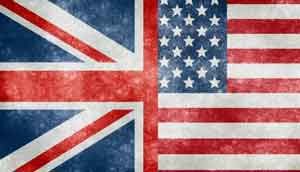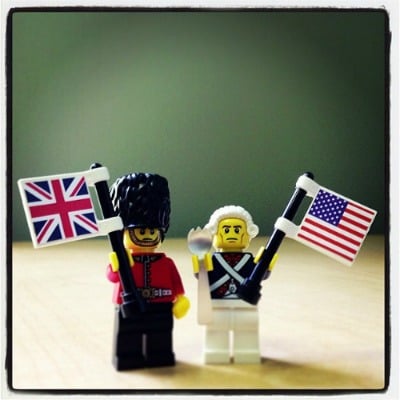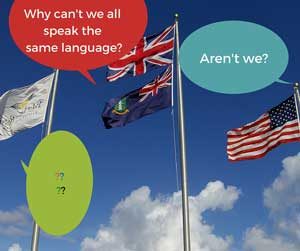In this increasingly globalized world, or globalised, using the correct form of English is paramount. The population of the US is over 300 million, while the UK is home to over 60 million people, therefore businesses must know the difference between British English vs American English.
1. British English vs American English: Spelling
Translation services providers must always localize their content depending on whether the audience is British or American. This means paying attention to differences in word or phrase usage, as well as other important differences between British and American English.
Spelling is probably the easiest to adopt and the most noticeable difference. Generally, there are 4 things to remember (there are more but these are the main items):
-
‘Ou’ – ‘O’:
Although only a small change, it is a noticeable one. Words like colour, behaviour and humour always carry the ‘ou’ in British English, yet look bizarre to an American English speaker. To become more ‘American,’ always drop the ‘U’ in these words. Thus, they become color, behavior and humor.
-
‘Sed’ – ‘Zed’:
This is another small difference between the two languages, but it stands out for both Americans and Britons. In the USA, words normally end in ‘…zed’ such as, industrialized, globalized and personalized. However, in the United Kingdom, you must always swap the ‘z’ for ‘s’. For example, industrialised, globalised and personalised.
-
“Ter” – “Tre”:
Another major spelling difference is the order of letters at the end of certain words. For example, take the American English words “theater”, “meter” or “center.” In British English, these words are spelled “theatre,” “metre” and “centre”. Depending on where you are, your computer will auto-correct words spelled in British English to American English or vice versa.
-
Dates:
This tip is not spelling-related, but it is a difference many struggle with. In the USA, the date is always in the form of Month/Day/Year, but across the pond it takes the form of Day/Month/Year. At first, this is confusing because you read the date 11/25/2016. A British mind will question whether there is a 25th month of the year. Always remember to use the correct form when reaching out to an American or British audience. This could have a serious impact.
2. British English vs American English: Pronunciation

Try these examples out for practice:
| British English | American English | |
| Tomato | Toe – MAR – toe | Toe – MAY – toe |
| Leisure | LEZH-uh | LEE – zhur |
| Vitamin | VIT-uh-min | VAI – tuh – min |
| Privacy | PRIV – uh – see | PRAI – ver – see |
| Zebra | ZEB – ruh | ZEE – Bruh |
| Yoghurt | YOG – urt | YOH – gurt |
| Herb | H-erb | ERB |
| Route | ROOT | ROUT |
| Vase | VARZ | VAYZE |
| Garage | GA – rige | Ga – RAHJ |
Interpreting services providers know these differences well and are selected on the basis of whether or not they are interpreting for an American or a British audience. Former British colonies may also pronounce words in accordance with the British. However, many countries are pushing American English because of US dominance in international business.
3. British English vs American English: Completely Different Words

1. In the US, you are on the first floor; in the UK you are on the ________________.
2. In the US, you put gas in your car; in the UK you put in __________________.
3. In the US, you wear a sweater; in the UK you wear a ____________________.
4. In the US, the back of a car is the trunk; in the UK it is the ________________.
5. In the US, the front of a car is the hood; in the UK it is the ________________.
6. In the US, you eat chips; in the UK you eat_____________________________.
7. In the US, you throw away trash; in the UK you throw away ______________.
8. In the US, you wear sneakers; in the UK you wear ______________________.
9. In the US, you take the elevator; in the UK you take the _________________.
10. In the US, you wear pants, in the UK you wear________________________.
About Language Connections:
Language Connections is one of the top language service companies in the US. Over the last 30 years, we’ve focused on providing the best business translation services, interpreting services, as well as interpreter training and customized language training programs. In addition to top-tier corporate language training, we offer certified corporate interpreters and professional business translation services in 200+ languages. Our network includes linguists with backgrounds in all major industries. They’re ready to meet your needs, whether they’re for technical translation services, legal translation, government translation services, international development translation services, education translation services, life sciences translation, or something else. Reach out to us today for a free quote on our cost-efficient and timely translation services, interpreters, or other linguistic services.
Language Connections Inc.
2001 Beacon Street, Suite 105,
Boston, MA 02135
Phone: +1-617-731-3510
Email: service@languageconnections.com
Answers:
1) Ground Floor, 2) Petrol, 3) Jumper, 4) Boot, 5) Bonnet, 6) Crisps, 7) Rubbish, 8) Trainers, 9) Lift, 10) Trousers



